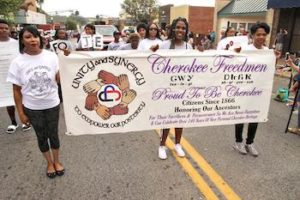
*On this date in 2017, Cherokee Nation v. Nash was ruled. This ruling gave descendants of African slaves of the Native American tribe Cherokee citizenship.
The decision stated that "the Cherokee Nation's sovereign right to determine its membership" was limited by an "1866 Treaty" giving certain descendants of former slaves held by the Cherokee Nation before the Civil War" a present right to citizenship in the Cherokee Nation that is coextensive with the rights of native Cherokees.” In writing his opinion,
Thomas F. Hogan, Senior United States District Judge, commented: “Although it is a grievous axiom of American history that the Cherokee Nation's narrative is steeped in sorrow as a result of United States governmental policies that marginalized Native American Indians and removed them from their lands, it is, perhaps, lesser-known that both nations' chronicles share the shameful taint of African slavery. This lawsuit harkens back a century and a half ago to a treaty entered into between the United States and the Cherokee Nation in the aftermath of the Civil War. In that treaty, the Cherokee Nation promised that "never here-after shall either slavery or involuntary servitude exist in their nation" and "all freedmen who have been liberated by voluntary act of their former owners or by law, as well as all free colored persons who were in the country at the commencement of the rebellion, and are now residents therein, or who may return within six months, and their descendants, shall have all the rights of native Cherokees."
In the late 20th century, the Cherokee Nation voted to restrict membership to only those descendants of individuals listed as "Cherokee by blood" on the Dawes Rolls of the early 20th century. This decision excluded most Cherokee Freedmen (by then, this term referred to the descendants of the original group). In 2011, the Cherokee Nation formally expelled Blacks from the tribe.
Judge Hogan examined the 1866 Treaty and the Dawes Roll between 1898 and 1914. In this case, the Cherokee Nation had held that their revised Constitution, which had expelled the Freedmen from the tribe in 1983 on the premise that they were not “blood” Cherokee (though many of them are of Black-Cherokee ancestry), held more legal weight than the 1866 treaty. However, the judge ruled that the Constitution does not negate the Freedmen’s treaty rights granted to their forebears at the end of the Civil War. In other words, Cherokee Freedmen are Cherokee.